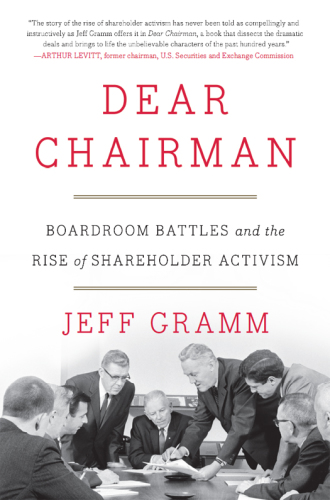
Dear Chairman
Boardroom Battles and the Rise of Shareholder Activism
- اطلاعات
- نقد و بررسی
- دیدگاه کاربران
نقد و بررسی

November 9, 2015
Gramm, a value-oriented hedge fund manager and adjunct professor at Columbia Business School, explores the history of shareholder activism from the 1920s though today in this insightful and well-written narrative. Gramm centers his study on eight shareholder letters that he views as key to the evolution of shareholder involvement and power, dedicating a chapter to each. These include Benjamin Graham’s 1927 letter to John D. Rockefeller Jr., which advocates for excess-capital distribution; Warren Buffett’s 1964 letter to American Express president and CEO Howard Clerk, a turning point in Buffett’s career; and Ross Perot’s 1985 letter to Roger Smith, chairman and CEO of General Motors, which exemplifies Perot’s candid, in-your-face style. Taken cumulatively, the letters give insight into how shareholder activism can both benefit and harm companies. Gramm’s findings will intrigue and inform history buffs and activist shareholders alike. Agent: Chris Pariss Lamb, Gernert Company.

December 15, 2015
The rise and triumph of shareholder activism through the previously unpublished letters of some of the U.S.'s most successful investors. A hedge fund manager who also teaches investing at Columbia Business School, Gramm looks at a variety of case studies, including Benjamin Graham and Northern Pipeline, Warren Buffett and his involvement in American Express, Electronic Data Systems founder Ross Perot and his battle with Roger Smith of General Motors, and Carl Icahn, who is still successfully chasing money-making deals after 50 years. Their battles to maximize shareholder rights--through takeovers, leveraged buyouts, cash distributions, or sales of public companies with underperforming or even incompetent managers--are told through their own correspondence. In the letters, which sometimes take the official form of Securities and Exchange Commission filings, investors outline their objectives and the motives that drive them to act. In a straightforward narrative, Gramm threads a path through abstractions about the rights of corporate ownership and the obligations of governance, highlighting the many ways conflicts of interest can develop "as long as investors are motivated by financial gain, and as long as they determine the makeup of boards of directors." The process he traces has led to circumstances under which we must ask the question, "why did shareholders triumph in the struggle for corporate control? Who were the key players that ushered in this period of so-called shareholder primacy?" Each of the battles he recounts involved different ways of valuing and realizing the asset value of companies. Political campaigns played their parts, as well, whether conducted behind the scenes or in the full glare of publicity. Now, writes the author, "judging activism purely based on stock performance can be tricky and superficial." Now that shareholders have secured their right to exercise control, Gramm's compelling account raises questions about where and how the new situation will aeffect the continuing maximization of profits.
COPYRIGHT(2015) Kirkus Reviews, ALL RIGHTS RESERVED.

Starred review from November 15, 2015
Gramm (investing, Columbia Business Sch.), who operates a value-oriented hedge fund, presents eight major and multiple other instances in the last 100 years in which individuals have challenged public company boards to improve shareholder value. All the examples presented show company managements and boards that seemed more beholden to one another than to their shareholders. Gramm profiles generally well-known figures who are powerful in their own right. They include Benjamin Graham, Warren Buffett, Carl Icahn, and Ross Perot. For each, the author provides a background, the corporate situation involved, and why the particular case is important. He depicts Perot as a populist maverick who challenged the General Motors' accounting mind-set that in the 1980s handicapped the company in competing with surging Asian car manufacturers. Gramm shows how each case fits in to what he sees as a long-term trend to greater shareholder activism in public company governance. Appendixes contain the text of the complaint letters sent to the boards in the eight primary cases. VERDICT Entertaining as well as intriguing, Gramm's work is a great read for both students of business and interested general readers.--Lawrence Maxted, Gannon Univ. Lib., Erie, PA
Copyright 2015 Library Journal, LLC Used with permission.




دیدگاه کاربران